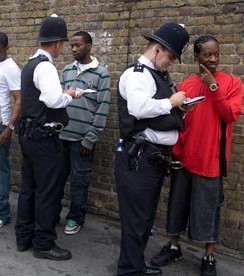UK police to follow new stop and search code
 (CNS): Following revelations in a Freedom of information request that stop and searches result in a less than 3% conversion rate to arrest in Cayman, all 43 police forces in England and Wales have agreed to adopt an official code of conduct in relation to such powers under the law. The UK home Secretary Theresa May has said the technique was being misused so often that it was damaging relations between the public and police. Here in the Cayman Islands the majority of stop and searches carried out by the RCIPS are as a result of officers suspecting that people may be carrying drugs but such a low success rate raises questions about the validity of police suspicions.
(CNS): Following revelations in a Freedom of information request that stop and searches result in a less than 3% conversion rate to arrest in Cayman, all 43 police forces in England and Wales have agreed to adopt an official code of conduct in relation to such powers under the law. The UK home Secretary Theresa May has said the technique was being misused so often that it was damaging relations between the public and police. Here in the Cayman Islands the majority of stop and searches carried out by the RCIPS are as a result of officers suspecting that people may be carrying drugs but such a low success rate raises questions about the validity of police suspicions.
In order to measure the practice and address allegaitons that stop and search is nothing more than racist, harassment by police, UK Officers will now record every outcome resulting from stop and search. Police will also soon allow public observers to watch stop and search in operation as well. Next year, British police will also start mapping where the practice is used so people can see if one area is targeted more than others, and the public will be entitled to know why this is the case.
The changes are being brought in after the Inspectorate of Constabulary found that 27% of stop and searches did not satisfy the requirement that there be "reasonable grounds for suspicion", meaning more than 250,000 of the one million searches conducted last year could have been illegal.
Here in Cayman an FOI revealed that in 2013 from 175 stops made by officers under section 41 of Cayman’s law relating to random stop and searchers based on suspicions just five proved to be warranted.
Ken Hinds, a member of the London borough of Haringey's stop and search monitoring group, does not believe the new code will be enough to change attitudes. "After 40 years of abuse of stop and search, we now refer to it as stop and scarred in our community. It has alienated whole swathes,” he said.
A black police inspector, Nick Glynn of the Leicestershire force, has already been chosen to lead reform of the way stop-and-search powers are used nationally. He said he had been stopped and searched himself about 30 times while off duty by officers from other forces.
Metropolitan Police Commander Adrian Hanstock said the new code supports the force's "ongoing drive to make stop and search more intelligence-led and effective".
See related story on CNS:
Drugs-dominate-stop-search
Category: Crime


In the U.K. it is very much a race issue and therefore not comparable to here. Different kettle of fish entirely.
In Cayman it is antionality issue, i.e. the majority of officers are Jamaican, majority of workers and status holders are Jamaicans yet the officers appear to go after local Caymanians versus their own.
Political correctness gone mad in the UK, interfering with the police targeting those most likely to be committing crimes.
In Cayman this is not a race issue. I bet you will find the police who 'randomly' stop and search these people are already individuals of interest , already have a criminal record and received an inside tip that they will be picked up and searched. You will also find that these searches are predominately Caymanians and individuals that could more than likely be charged for being a tramp, vagrancy, loitering, disorderly conduct, public drunkeness, illegal tint, loud music in the car, not wearing a seatbelt etc and the list can go on.